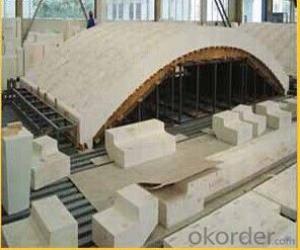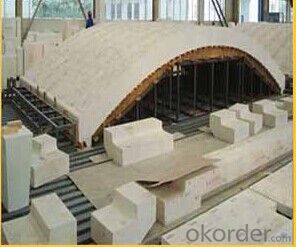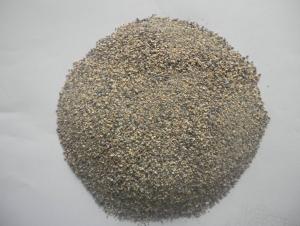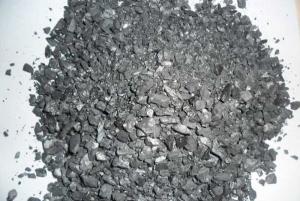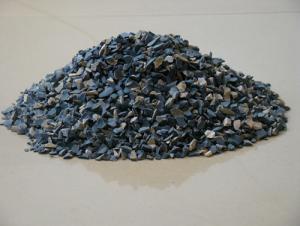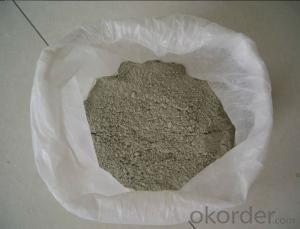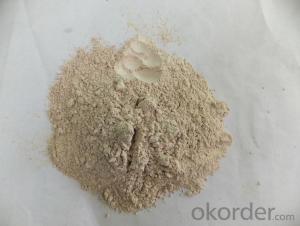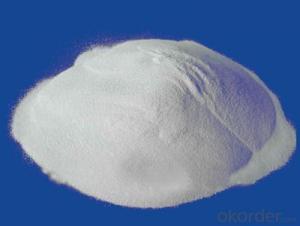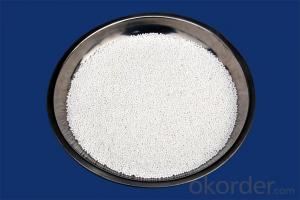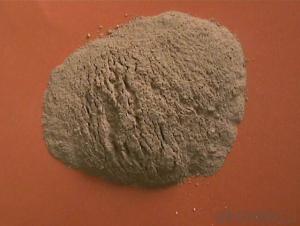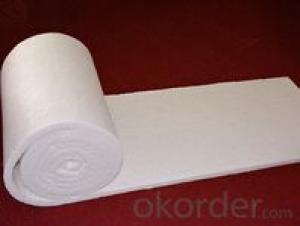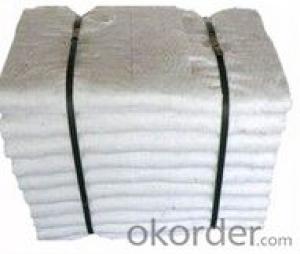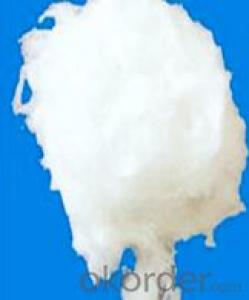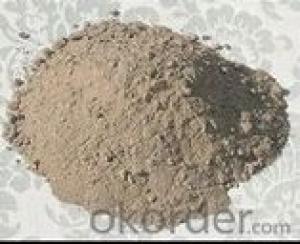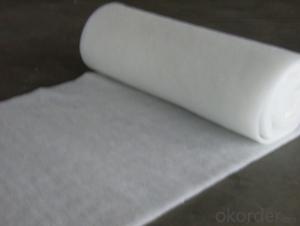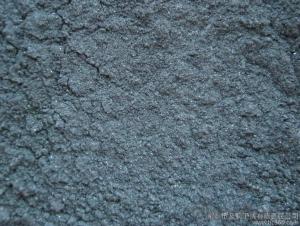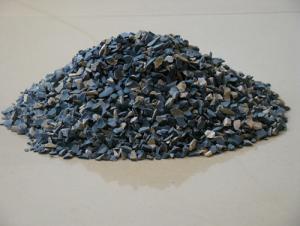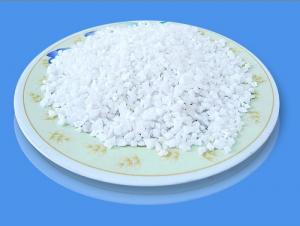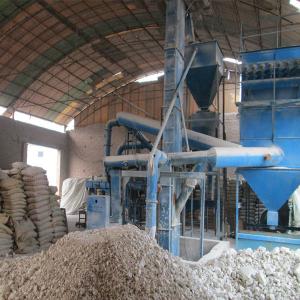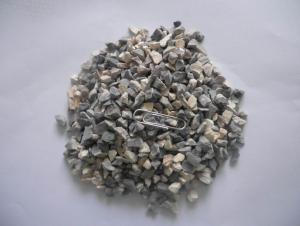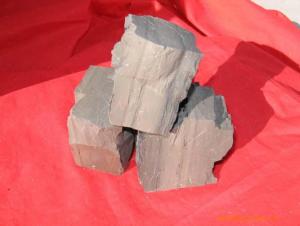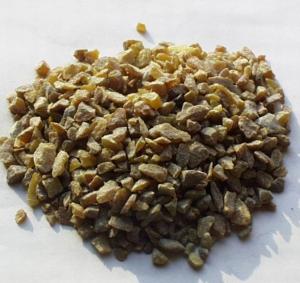Raw Materials for Refractory Glass Furnace Superstructures Refractory Block
- Loading Port:
- Qingdao
- Payment Terms:
- TT OR LC
- Min Order Qty:
- 500 m.t.
- Supply Capability:
- 1000 m.t./month
OKorder Service Pledge
OKorder Financial Service
You Might Also Like
Features:
1. Strong glass corrosion resistance and high thermal shack stability.
2. Good RUL, wear-resistance, dregs-resistance and alkali corrosion resistance.
3. The products are adopting superior material, with process by special arc furnace forming it. This fused cast technology got nearly no suffer from electrode pollution. They can be widely used in the lining of glass furnace, the chemical industrials, metallurgical furnace.
Our company can produce serious specification fused cast 33#, 36#, 41#AZS block for glass furnace and its output is over 5000tons per year. In the enormous working premises—more than 6600square meters, there are one 5tons outside cooling electric arc furnace, high-power transformer, thaw craft with computer control system and internal advanced fused cast refractory umeral control grinding equipments according to its body producing ability.
Erosion-resistance to glass metal
Physical and chemical index of Fused Cast AZS41# for glass furnace
Item | Behaviors | |||
AZS-33# ER 1681 | AZS-36# ER 1685 | AZS-41# ER 1711 | ||
Chemical Composition | Al2O3 | ≥50.00 | ≥49.00 | ≥45.00 |
ZrO2 | ≥32.50 | ≥35.50 | ≥40.50 | |
SiO2 | ≤15.50 | ≤13.50 | ≤13.00 | |
Na2O+K2O | ≤1.30 | ≤1.35 | ≤1.30 | |
Bulk density g/cm3 | ≥3.75 | ≥3.85 | ≥4.00 | |
Apparent Porosity % | ≤1.2 | ≤1.0 | ≤1.2 | |
Cold Crushing Strength Mpa | ≥300 | ≥300 | ≥300 | |
Exudation Temperature of Glass Phase | ≥1400 | ≥1400 | ≥1410 | |
Bubble Separation Ratio(1300°C×10h) | ≤1.2 | ≤1.0 | ≤1.0 | |
Anti-corrosion rate of glass liquid 1500°C×36h (mm/24h)% | ≤1.4 | ≤1.3 | ≤1.2 | |
Apparent density (g/cm3) | PT(RN RC N) | ≥3.50 | ≥3.50 | ≥3.70 |
ZWS(RR EVF EC ENC) | ≥3.65 | ≥3.70 | ≥3.90 | |
WS( RT VF EPIC FVP DCL) | ≥3.75 | ≥3.8 | ≥4.00 | |
1.High purity
Good self-sharpening
Grinding ability
Resistance to acid and alkali corrosion, high temperature thermal stability is good
- Q: Does anyone know the difference between refractory and thermal insulation material?
- Refractory refers to inorganic nonmetallic material, whose refractorinessis not less than 1,580℃, but refractory is not necessarily insulated material. Inorganic thermal insulation material also belongs to refractory as long as its refractoriness is higher than 1580℃.
- Q: For refractory knowledge. What is the ratio of clay ramming?mass?
- Soil aggregates, dispersing agent, water reducing agent, plasticizer, binding agent and powder! ~ Bone meal feed approximately 6, OK
- Q: Fire rating of decoration materials
- You can refer to (code for fire protection design of buildings)
- Q: Does anyone know what is a lightweight refractory material?
- I am ignorant of this!!
- Q: What do refractory materials include?
- It is so difficult.
- Q: Urgent question: could you tell me that the export of refractory materials to Vietnam is to be packed in wooden cases and smoked?
- If the outer packing is made of solid wood, it must be fumigated! If it is not solid wood, you can do without!
- Q: What are the differences between first-level fire-resistant materials and second-level fire-resistant materials?
- 1, these refer to fire resistance rating of building materials. 2, As for steel, elements that used in different parts should reach different duration of fire resistance according to fire resistance rating. For example, fire resistant pillars of first level can endure fire within 3 hours; the second level, 2.5 hours; the third level, 2 hours. With respect to beams, three levels of fire resistance are included.
- Q: What is refractory?
- Refractory materials are widely used in metallurgy, machinery manufacturing, chemical industry, petroleum, power and other industrial fields. It is an inorganic nonmetallic material mostly used in metallurgical industry with the minimum refractoriness of 1580 ℃, able to resist high temperature without softening (annealing). It accounts for 50% to 60% in total output. Refractoriness refers to refractory's ability to resist fire.
- Q: Can the teflon material resist fire?
- Teflon material does not burn, but the heat resistance temperature of it is about 300℃.
- Q: How to classify fire resistance rating of brick-concrete structure?
- In order to ensure the safety of the building, the fire protection measures must be taken to make it have a certain degree of fire resistance, even if there is a fire, it will not cause too much damage. According to the national conditions of our country, and in the light of other countries standards, < high-rise civil building fire protection design specification > defines fireproof rank of high-rise civil buildings into level one and two; < code for fire protection design of buildings > divides the rank into level one, two, three, four, level one is the highest level, level four is the lowest. Besides that the minimum fire resistance of the building component is specified, buildings of fire resistance rating also specified requirements for combustion performance. Because the component with the same fire resistance limit is different, it is different in the fire.According to our country national standard < building design fire protection code >, the fire resistance rating of the building is divided into four levels. The fire resistance of a building is determined by the combustion performance and fire resistance of building components (such as beams, columns, floors, walls, etc.). Generally speaking, the fire resistance building of level one is a mixed structure of reinforced concrete structure or a mixture of brick wall and steel concrete structure; the fire resistance building of level two is a mixed structure of steel truss structure, reinforced concrete column and brick wall; the fire resistance building of level three is brick-wood structure made of wood roof and brick wall; the fire resistance building of level four is combustible structure which is composed of wood roof and non-combustible wall.
Send your message to us
Raw Materials for Refractory Glass Furnace Superstructures Refractory Block
- Loading Port:
- Qingdao
- Payment Terms:
- TT OR LC
- Min Order Qty:
- 500 m.t.
- Supply Capability:
- 1000 m.t./month
OKorder Service Pledge
OKorder Financial Service
Similar products
Hot products
Hot Searches
Related keywords
